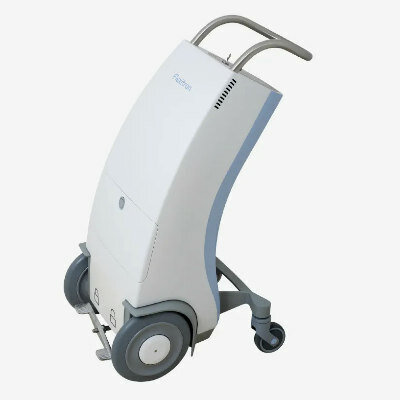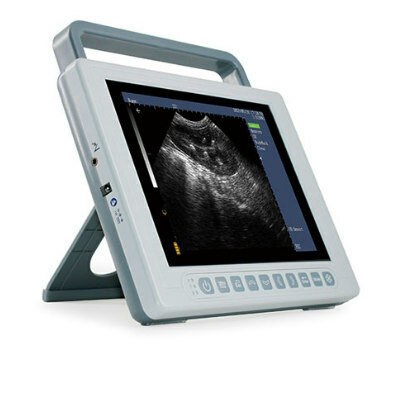Launch Announced of 3D System for Ultrasound-Guided Spinal Anesthesia
|
By MedImaging International staff writers Posted on 24 May 2016 |

Image: The Accuro handheld ultrasound system (Photo courtesy of Rivanna Medical).
A fast-growing medical device company has announced the launch of a novel ultrasound-based system that can help clinicians apply spinal and epidural anesthesia using automated 3D navigation of the lumbar spine.
The handheld device provides precise identification of the location for the epidural procedure, as well as the required depth and trajectory.
Rivanna Medical (Charlottesville, VA, USA) announced the availability of the Accuro system in the Middle East, several months following its launch. The system is intended to prevent complications and improve outcomes during ultrasound-guided spinal anesthesia, and already has US FDA 510(k) clearance for spinal anesthesia guidance and other imaging applications, including diagnostic imaging of abdominal and musculoskeletal anatomies.
Will Mauldin, chairman and CEO of Rivanna Medical, said, “We have worked quickly to establish strategic, international distribution partnerships with local leaders such as Techno Orbits and Atlas Medical. These partnerships in Saudi Arabia and the United Arab Emirates, respectively, demonstrate the far-reaching significance and opportunity of our easy-to-use Accuro device. The Middle East expansion, combined with the level of regional market adoption we have seen for Accuro, is a strong indication of Rivanna Medical’s continued success on all fronts. If we can increase the efficiency of epidural and spinal anesthesia with fewer needle sticks, while reducing complications and costs then this is clearly an improvement for both the anesthesia community and the patient.”
Related Links:
Rivanna Medical
The handheld device provides precise identification of the location for the epidural procedure, as well as the required depth and trajectory.
Rivanna Medical (Charlottesville, VA, USA) announced the availability of the Accuro system in the Middle East, several months following its launch. The system is intended to prevent complications and improve outcomes during ultrasound-guided spinal anesthesia, and already has US FDA 510(k) clearance for spinal anesthesia guidance and other imaging applications, including diagnostic imaging of abdominal and musculoskeletal anatomies.
Will Mauldin, chairman and CEO of Rivanna Medical, said, “We have worked quickly to establish strategic, international distribution partnerships with local leaders such as Techno Orbits and Atlas Medical. These partnerships in Saudi Arabia and the United Arab Emirates, respectively, demonstrate the far-reaching significance and opportunity of our easy-to-use Accuro device. The Middle East expansion, combined with the level of regional market adoption we have seen for Accuro, is a strong indication of Rivanna Medical’s continued success on all fronts. If we can increase the efficiency of epidural and spinal anesthesia with fewer needle sticks, while reducing complications and costs then this is clearly an improvement for both the anesthesia community and the patient.”
Related Links:
Rivanna Medical
Latest Ultrasound News
- Deep Learning Advances Super-Resolution Ultrasound Imaging
- Novel Ultrasound-Launched Targeted Nanoparticle Eliminates Biofilm and Bacterial Infection
- AI-Guided Ultrasound System Enables Rapid Assessments of DVT
- Focused Ultrasound Technique Gets Quality Assurance Protocol
- AI-Guided Handheld Ultrasound System Helps Capture Diagnostic-Quality Cardiac Images
- Non-Invasive Ultrasound Imaging Device Diagnoses Risk of Chronic Kidney Disease
- Wearable Ultrasound Platform Paves Way for 24/7 Blood Pressure Monitoring On the Wrist
- Diagnostic Ultrasound Enhancing Agent to Improve Image Quality in Pediatric Heart Patients
- AI Detects COVID-19 in Lung Ultrasound Images
- New Ultrasound Technology to Revolutionize Respiratory Disease Diagnoses
- Dynamic Contrast-Enhanced Ultrasound Highly Useful For Interventions
- Ultrasensitive Broadband Transparent Ultrasound Transducer Enhances Medical Diagnosis
- Artificial Intelligence Detects Heart Defects in Newborns from Ultrasound Images
- Ultrasound Imaging Technology Allows Doctors to Watch Spinal Cord Activity during Surgery

- Shape-Shifting Ultrasound Stickers Detect Post-Surgical Complications
- Non-Invasive Ultrasound Technique Helps Identify Life-Changing Complications after Neck Surgery
Channels
Radiography
view channel
Novel Breast Imaging System Proves As Effective As Mammography
Breast cancer remains the most frequently diagnosed cancer among women. It is projected that one in eight women will be diagnosed with breast cancer during her lifetime, and one in 42 women who turn 50... Read more
AI Assistance Improves Breast-Cancer Screening by Reducing False Positives
Radiologists typically detect one case of cancer for every 200 mammograms reviewed. However, these evaluations often result in false positives, leading to unnecessary patient recalls for additional testing,... Read moreMRI
view channel
PET/MRI Improves Diagnostic Accuracy for Prostate Cancer Patients
The Prostate Imaging Reporting and Data System (PI-RADS) is a five-point scale to assess potential prostate cancer in MR images. PI-RADS category 3 which offers an unclear suggestion of clinically significant... Read more
Next Generation MR-Guided Focused Ultrasound Ushers In Future of Incisionless Neurosurgery
Essential tremor, often called familial, idiopathic, or benign tremor, leads to uncontrollable shaking that significantly affects a person’s life. When traditional medications do not alleviate symptoms,... Read more
Two-Part MRI Scan Detects Prostate Cancer More Quickly without Compromising Diagnostic Quality
Prostate cancer ranks as the most prevalent cancer among men. Over the last decade, the introduction of MRI scans has significantly transformed the diagnosis process, marking the most substantial advancement... Read moreNuclear Medicine
view channel
New SPECT/CT Technique Could Change Imaging Practices and Increase Patient Access
The development of lead-212 (212Pb)-PSMA–based targeted alpha therapy (TAT) is garnering significant interest in treating patients with metastatic castration-resistant prostate cancer. The imaging of 212Pb,... Read moreNew Radiotheranostic System Detects and Treats Ovarian Cancer Noninvasively
Ovarian cancer is the most lethal gynecological cancer, with less than a 30% five-year survival rate for those diagnosed in late stages. Despite surgery and platinum-based chemotherapy being the standard... Read more
AI System Automatically and Reliably Detects Cardiac Amyloidosis Using Scintigraphy Imaging
Cardiac amyloidosis, a condition characterized by the buildup of abnormal protein deposits (amyloids) in the heart muscle, severely affects heart function and can lead to heart failure or death without... Read moreGeneral/Advanced Imaging
view channel
New AI Method Captures Uncertainty in Medical Images
In the field of biomedicine, segmentation is the process of annotating pixels from an important structure in medical images, such as organs or cells. Artificial Intelligence (AI) models are utilized to... Read more.jpg)
CT Coronary Angiography Reduces Need for Invasive Tests to Diagnose Coronary Artery Disease
Coronary artery disease (CAD), one of the leading causes of death worldwide, involves the narrowing of coronary arteries due to atherosclerosis, resulting in insufficient blood flow to the heart muscle.... Read more
Novel Blood Test Could Reduce Need for PET Imaging of Patients with Alzheimer’s
Alzheimer's disease (AD), a condition marked by cognitive decline and the presence of beta-amyloid (Aβ) plaques and neurofibrillary tangles in the brain, poses diagnostic challenges. Amyloid positron emission... Read more.jpg)
CT-Based Deep Learning Algorithm Accurately Differentiates Benign From Malignant Vertebral Fractures
The rise in the aging population is expected to result in a corresponding increase in the prevalence of vertebral fractures which can cause back pain or neurologic compromise, leading to impaired function... Read moreImaging IT
view channel
New Google Cloud Medical Imaging Suite Makes Imaging Healthcare Data More Accessible
Medical imaging is a critical tool used to diagnose patients, and there are billions of medical images scanned globally each year. Imaging data accounts for about 90% of all healthcare data1 and, until... Read more
Global AI in Medical Diagnostics Market to Be Driven by Demand for Image Recognition in Radiology
The global artificial intelligence (AI) in medical diagnostics market is expanding with early disease detection being one of its key applications and image recognition becoming a compelling consumer proposition... Read moreIndustry News
view channel
Bayer and Google Partner on New AI Product for Radiologists
Medical imaging data comprises around 90% of all healthcare data, and it is a highly complex and rich clinical data modality and serves as a vital tool for diagnosing patients. Each year, billions of medical... Read more



















